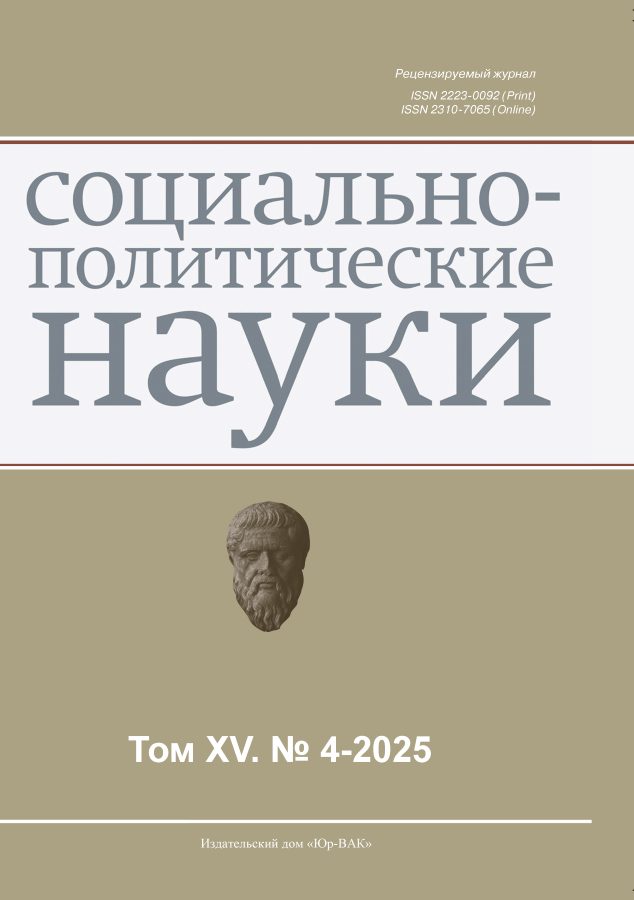Typology of Russian youth by the degree and nature of the use of digital technologies in financial and economic relations
- 作者: Sablukov A.V.1, Popov S.V.2
-
隶属关系:
- Moscow State Linguistic University
- Moscow University “Synergy”
- 期: 卷 15, 编号 4 (2025)
- 页面: 245-253
- 栏目: Political Sociology
- URL: https://journals.eco-vector.com/2223-0092/article/view/693266
- DOI: https://doi.org/10.33693/2223-0092-2025-15-4-245-253
- EDN: https://elibrary.ru/XQWZQX
- ID: 693266
如何引用文章
详细
In the context of the rapid digitalization of modern society, financial culture is becoming a significant factor in the social differentiation of young people. The purpose of this study is to identify and theoretically substantiate the typology of Russian youth, reflecting the degree and features of the use of digital technologies in financial and economic interactions. The theoretical basis of the work is based on the conceptualization of financial culture as a complex system of knowledge, value orientations and practical models that determine the behavior of individuals in the field of money management. Special emphasis is placed on the relationship between financial culture and digital literacy, considered as an important element of social capital. The empirical basis of the study was made up of data from an online survey conducted in 2024–2025 involving 883 respondents aged 18 to 35 from 21 regions of the Russian Federation. A stratified sample was used in the study, which ensured the representativeness of the results. Additionally, the paper analyzes the existing theoretical approaches and sociological concepts of the study of financial culture. As a result of the study, four stable types of financial behavior of young people in the digital environment have been identified. The results of the study. The comparative analysis demonstrated the close relationship of the identified typology with the level of education, income and territorial affiliation of the respondents. The results obtained confirm that the digital involvement of young people is becoming a new stratification marker that determines the prospects for social mobility and requires the development of targeted educational and social policy measures.
全文:
作者简介
Alexander Sablukov
Moscow State Linguistic University
编辑信件的主要联系方式.
Email: asablukov@mail.ru
ORCID iD: 0000-0003-3499-1896
SPIN 代码: 9440-7240
Dr. Sci. (Sociol.), Professor, Professor, Department of Sociology
俄罗斯联邦, MoscowSergey Popov
Moscow University “Synergy”
Email: spopov-senergy@mail.ru
ORCID iD: 0009-0001-5618-1248
SPIN 代码: 2929-6816
senior lector
俄罗斯联邦, Moscow参考
- Aimaletdinov T.A., Tsimbal M.V. Perception of modern technologies by the older generation: a comparative analysis. Digital Sociology. 2023. No. 6 (4). Pp. 79–94. (In Rus.)
- Bystrova N.V., Urakova E.A., Nazarova E.N. Financial literacy of youth in the digital economy. Problems of Modern Teacher Education. 2022. No. 77-1. Pp. 87–90. (In Rus.)
- Vagapova D.R. Financial culture of Russian youth: Financial literacy, behavior and practices. In: Modern sociological science: Key trends and prospects of social research. Collection of scientific papers of the V International Conference “Kazan Sociological Readings” (Kazan, May 20–21, 2022). Kazan: Kazan University Publishing House, 2022. Pp. 158–164.
- Golubeva K.A. Financial culture among young people: The experience of sociological research. Theory and Practice of Social Development. 2022. No. 3 (169). Pp. 59–63. (In Rus.)
- Koval A.N., Koval Yu.N. Financial literacy of the Russian population. Economics and Business: Theory and Practice. 2022. No. 1-1. Pp. 106–108. (In Rus.)
- Kunizheva D.A. Financial culture: The versatility of the concept, research approaches and place in scientific discourse. Theory and Practice of Social Development. 2023. No. 7 (183). Pp. 107–112. (In Rus.)
- Panfilova A.O., Savvinova K.A. Financial culture of students. Society and Security Insights. 2022. Vol. 5. No. 3. Pp. 172–189. (In Rus.)
- Razov P.V., Alikperova N.V. Factors of influence on investment behavior of the population. In: Saving the Russian population: Health, employment, standard and quality of life. Proceedings of the International Scientific and Practical Conference V Rimashev Readings (Moscow, March 29, 2022). V.V. Lokosov, V.G. Dobrokhleb, M.V. Belikova (eds.). Moscow: FNISC RAS, 2022. Pp. 372–377.
- Sablukov A.V. Financial culture as a new quality of participants in financial relations in modern Russia. Bulletin of the Moscow State Linguistic University. Social Sciences. 2024. No. 3 (856). Pp. 122–127. (In Rus.)
- Sorokin A.E., Gorbanets K.S. Financial literacy as a component of human functional literacy. Economics and Business: Theory and Practice. 2022. No. 5-3. Pp. 93–95. (In Rus.)
- Fatikhov A.I. Bank panic: Causes and consequences. Society: Sociology, Psychology, Pedagogy. 2017. No. 2. Pp. 20–24. (In Rus.)
- Khizhnaya A.V., Nazarova A.N., Nazarova E.N. The relationship between the concepts of “financial literacy”, “financial education” and “financial culture”. Problems of Modern Teacher Education. 2023. No. 81-1. Pp. 260–261. (In Rus.)
- Chernysheva E.V., Ivanova A.A. The influence of financial culture on the financial behavior of citizens. Bulletin of Tomsk State University. Economy. 2024. No. 68. Pp. 219–234. (In Rus.)
- Ingale K.K., Paluri R.A. Financial literacy and financial behaviour: A bibliometric analysis. Review of Behavioral Finance. 2022. Vol. 14. No. 1. Pp. 130–154.
- Prete A.L. Digital and financial literacy as determinants of digital payments and personal finance. Economics Letters. 2022. Vol. 213. Pp. 110–120.
补充文件








